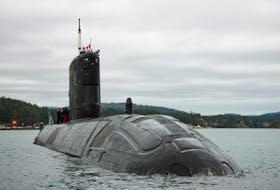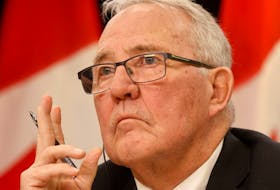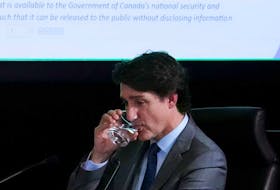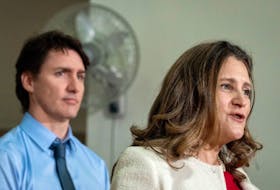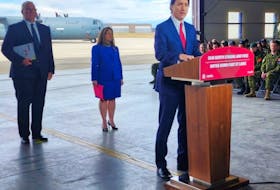When Justin Trudeau was looking for an opponent to fight in a charity boxing match, he approached then defence minister, Peter MacKay, who quickly assessed that he had more to lose than he could possibly gain and promptly turned him down.
Nine years later, MacKay is a Conservative leadership candidate, with aspirations to take on Trudeau at the next election. Now he says he’d reconsider the proposal. “I’d rather fight him UFC rules. Or on the ice — no headgear, no gloves,” he said, blithely.
The two men might not make it into the ring but few would bet against the matchup at the next election. The field of serious contenders has melted away in fortuitous fashion for MacKay. Former veterans affairs minister Erin O’Toole appears his only serious competition, in the absence of new entrants.
Part of the reason he has emerged as pre-eminent is that he is winning support from all corners of the Conservative coalition — former minister Monte Solberg, an early Reformer, and Quebec MP Pierre Paul-Hus are the latest to offer their backing and are indicative of the ecumenical nature of the MacKay team.
In an interview in a suburban Ottawa roadhouse, I asked him about his relations with former prime minister Stephen Harper. MacKay said they still talk on occasion and he informed him of his candidacy ahead of time.
Would Harper be comfortable with him as leader? “I think he would. Certainly as happy as I was with him,” MacKay said, in rather enigmatic fashion.
His campaign launched in his native Pictou County, N.S., on Saturday and there was a lot for Conservatives to like. Would he say he was pushing an unabashedly centre-right agenda?
We say we believe in smaller government, so why do we want government legislating on our private lives on the most intimate matters?
“I’m not one into labels because I’ve heard them all — Red Tory, moderate centrist and so on. It depends on the issues. There is an overwhelming consensus among Conservatives on economic issues, law and order and security. It frays a bit at the edges on social issues,” he said.
He said his own views have evolved. “People may have started out with socially conservative views but as you go through life, they change,” he said, acknowledging he voted against same-sex marriage in 2005 but voted not to reopen the issue in 2006.
“We say we believe in smaller government, so why do we want government legislating on our private lives on the most intimate matters?”
While he shied away from positioning himself on the political spectrum, he recognized that Trudeau’s Liberals have veered in a more progressive direction than many Canadians feel comfortable with — presenting whoever is the next Conservative leader with an opportunity.
“I don’t like attempts to highlight a class system, where the middle class are against the upper class.”
He said the Liberals have created disincentives to hard work, so that workers who work extra hours see the government claw back most of their overtime in tax.
He criticized Trudeau’s regulatory and tax approach to the energy sector. “The economy and the environment can coexist. But that doesn’t mean an immediate or rapid phasing out of the oil sector. Even the UN recognizes it’s a 30-40 year transition period,” he said.
MacKay would not be drawn on his position on carbon pricing but it did not sound radically different from the stance taken by current leader, Andrew Scheer — a reduction in greenhouse gas emissions through a combination of new technology and energy exports.
“We are somewhat down the road of carbon pricing in B.C. and we’re not seeing an impact in the form of drastic reductions in greenhouse gas emissions or a curbing of the tendency to use fossil fuels,” he said. “I’m not convinced thus far.”
MacKay has many qualities to commend him to party members — first and foremost, everybody likes Peter. Perhaps not everybody. But it’s rare to find a former colleague or even a political adversary who genuinely dislikes him. There is much to be said for a likable leader.
He also has broad experience in three of the major portfolios of state — foreign affairs, defence and justice — over the course of an 18-year career in the House of Commons.
But any politician with those credentials will have an albatross or two hanging round their neck, stinking or otherwise. Social media was abuzz with some of MacKay’s alleged bloopers — a $47,000 photo op inside a mock up of the F35 fighter plane; the use of military hardware for personal use in the case of “Cormorant-gate” helicopter affair; the loan of a neighbour’s dog for his infamous potato patch interview, following his breakup with Belinda Stronach (and her defection to prop up Paul Martin’s Liberals).
MacKay is unapologetic about it all — the photo op cost included the calculated cost of using a Defence Department building and electricity for the media; he cut short a vacation at the insistence of the prime minister’s office to attend a Defence Department event in the case of the helicopter; the dog wasn’t rented, it belonged to his dad. “I was going to ask my father for the registration for that dog to show you — he bought it from a dealer in B.C.,” he said. “As for the F35, we should have bought it.”
That may wash. But a controversy he will be less likely to sidestep is his French, which is wobbly, even to those of us with intermediate language skills.
So far, MacKay has appeared in a controlled environment, reading a teleprompter to make short, awkward sounding sentences in his launch speech.
But could he debate the leader of the Bloc Québécois, Yves-Francois Blanchet, or even talk to a Quebec voter?
“I think so. I’m going to have to improve. Working in an unilingual environment in the private sector, I’ve not had as much opportunity to use it as I had in Ottawa,” he said.
I pointed out his French skills weren’t great even when he was an MP. For someone who entered his launch event to Bruce Springsteen’s Born to Run, shouldn’t they be better by now?
“I have to bring it back but I had it at a very decent level,” he said.
He had best hope so. In 2006, when Stronach was asked in French if she was considering a run at the Liberal leadership, she asked for the question to be repeated in English. It sunk her campaign before it even launched.
MacKay may be the front-runner but a repeat of that episode could prove calamitous.
Long gone is the time when politicians who aspire to become Canada’s prime minister are unable to speak to one quarter of its citizens in their native tongue.
Twitter.com/IvisonJ
Copyright Postmedia Network Inc., 2020

